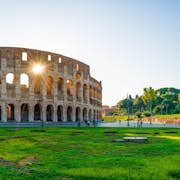
Check availability
13 options • from $21.38


Castel Sant'Angelo: Priority Entrance Ticket + Optional Audio Guide
- Duration: 2h
- Audio guide

Castel Sant'Angelo: Fast-Track Ticket + Express Guided Tour
- Duration: 1h
- Live guide in English
- Group of max. 20 people


Castel Sant'Angelo: Entry Ticket + Audio Guide
- Duration: 2h
- Audio guide
- Group of max. 20 people

Castel Sant'Angelo: Skip The Line Ticket
- Duration: 2h
- Group of max. 30 people

Rome Tourist Card
- Colosseum, Roman Forum & Palatine Hill
- Vatican Museums & Sistine Chapel
- Pantheon or St. Peter's Basilica or Castel Sant' Angelo
+ 1 other top thing to do

Castel Sant'Angelo: Skip The Line Ticket + Guided Tour
- Duration: 2h 30mins
- Live guide in English, Italian
- Group of max. 20 people


Castel Sant'Angelo: Fast Track Ticket + Guided Tour
- Duration: 2h
- Live guide in English
- Group of max. 20 people

Rome: Castel Sant'Angelo Skip-the-Line Ticket + Audio Guide
- Audio guide
- Group of max. 20 people

Rome: Castel Sant'Angelo Skip-the-Line Ticket with Audio Guide
- Duration: 2h
- Audio guide
- Group of max. 30 people

Castel Sant'Angelo: Skip The Line Ticket + Guided Tour
- Duration: 2h
- Live guide in English
- Group of max. 15 people
Hand-picked combinations
Combine Castel Sant'Angelo with other Rome favorites. Some things are better together.
Tickets overview
-
Castel Sant'Angelo was originally built as a tomb for the ashes of Emperor Hadrian
-
It's unique cylindrical structure makes it a stand-out building from other ancient Roman ruins
-
When it was converted into a military fortress in 402 AD, much of its original decor was lost or destroyed
-
Castel Sant'Angelo was made into a protective castle by several popes
-
Built over the river Tiber, Castel Sant'Angelo now stands guard near the entrance of Vatican City (although it is still managed by Rome)
With 1.2 million annual visitors (and counting), acquiring your Castel Sant'Angelo tickets in advance is always a good idea, especially during Rome's high season.
Choose the right Castel Sant'Angelo ticket for you:
-
General entrance to Castel Sant'Angelo tickets
-
Join a guided tour
-
Spending some time in Rome and Vatican City? Consider a City Pass
-
Castel Sant'Angelo is closed on Mondays, as well as January 1, May 1, and December 25
-
Children aged 18 and younger can enter for free. Check the Castel Sant'Angelo website to see if you qualify for discounted admission
-
This venue has limited wheelchair access
-
Admission is free on the first Sunday of every month
-
Budget at least an hour for a thorough visit of Castel Sant'Angelo
Castel Sant'Angelo FAQs
There's lots in store when you enter Rome's Castel Sant'Angelo. This multipurpose structure has stood on the Tiber River for generations and its history is recorded in 6 unique floors:
- Ground level: display of medieval weapons
- 1st level: mausoleum with the original tomb of Emperor Hadrian
- 2nd level: former prison
- 3rd level: Renaissance-era decor, art, and other artifacts
- 4th level: former papal apartments
- 5th level: roof terrace and views of Rome
Since its construction in the 2nd century, Castel Sant'Angelo has served as the ultimate multipurpose structure – from mausoleum to prison, and papal apartments to modern museum.
In addition to its many purposes over the years, Castel Sant'Angelo continues to stand constant guard over the Bridge of Angels, which connects the border of Rome to the holy Vatican City.
With so many sites to visit in Rome, it's easy to get carried away by the culture and history of the ancient world. Make sure you add Castel Sant'Angelo to your list and budget 2-3 hours to explore the castle.
If you are seeing other sites in Rome, it's helpful to know that Castel Sant'Angelo is a 35-minute walk (2.9 km or 1.8 mi) from the Colosseum, and a 6-minute walk (1.3 km or 0.8 mi) from Vatican City.
Castel Sant'Angelo reviews
Customer images



About: Castel Sant'Angelo
The towering cylinder of Castel Sant'Angelo, and its statue of Archangel Michael, is an instantly recognizable silhouette on the banks of the Tiber.
Initially built as a mausoleum for Emperor Hadrian and his family, its purpose has changed many times over the years, from a fortress, a residence, a prison, and now a museum.













































